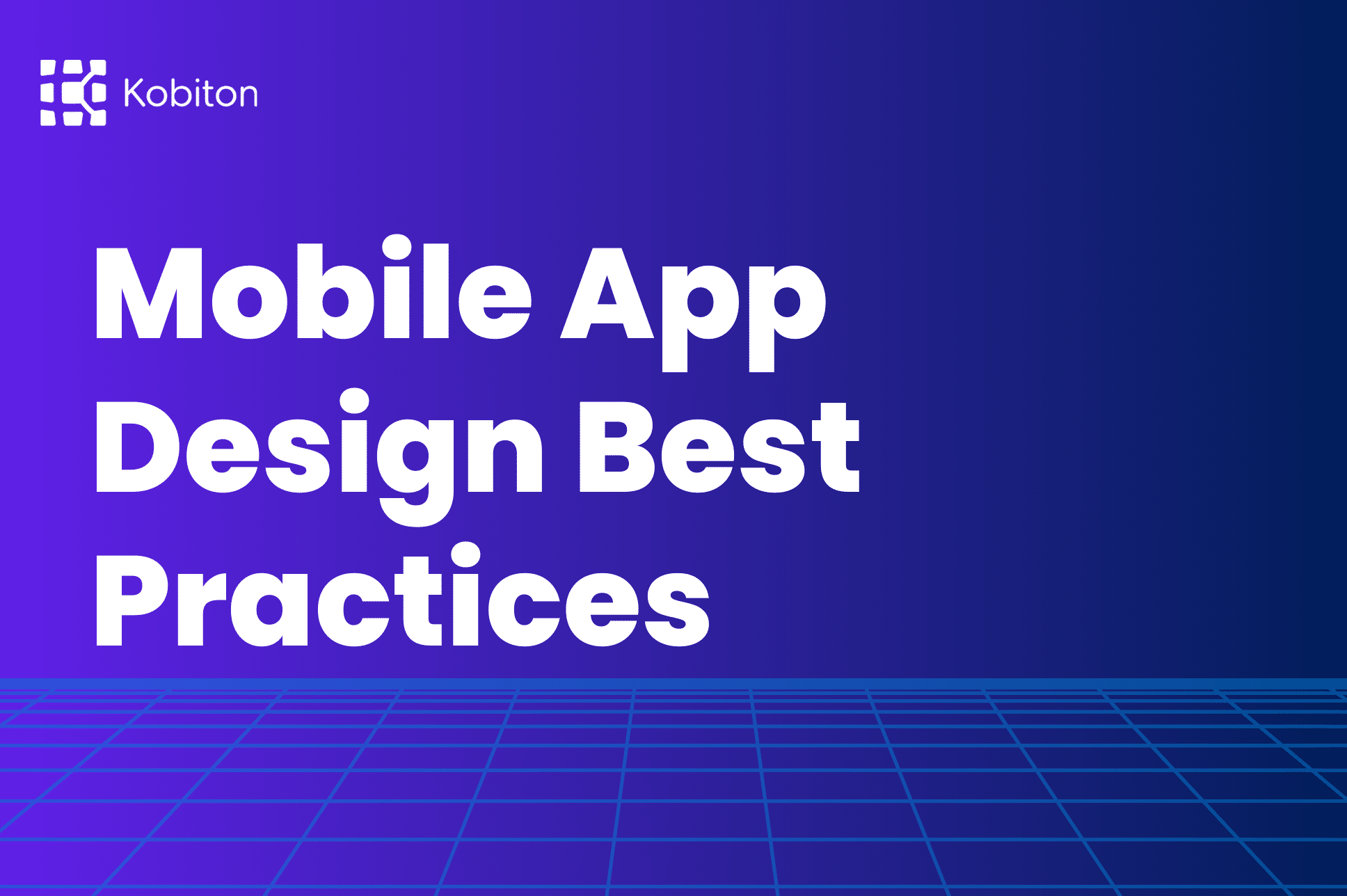
Best Practices to Elevate Your Mobile App Design

Cara Suarez
We are entering the busiest shopping season of the year and on top of that, mobile commerce sales are projected to soar to $856 billion by 2027. To stay competitive, organizations like yours need to focus more than ever on mobile app testing best practices.
Focusing on
Real device testing allows for scalability, accessibility, usability, and reduces downtime – concerns for the development team. Scalability allows teams to test their app for performance during high usage periods and downtimes, ensuring reliability. Accessibility allows DevOps teams to validate usability for all users, including those with disabilities. The usability of real device testing allows testers to test from anywhere at any time using a unified control portal. Lastly, downtime is greatly reduced because performance issues and bugs that can only be detected on a real device will be caught earlier.
Kobiton’s real-device testing ensures that apps perform optimally across the wide array of devices customers use. It captures issues that simulators might miss, providing an authentic user experience, reducing cart abandonment, and improving engagement during high-traffic periods. Furthermore, flexible deployment allows retailers to scale and adapt quickly, maintaining data privacy and compliance with ease. By incorporating Kobiton’s AI-driven automation, QA teams can expedite testing processes, reduce costs, and improve accuracy—before your app hits the holiday rush.
Integration of mobile app testing within CI/CD pipelines is mandatory to release updates quickly, enhance automation, and reduce manual efforts. During high-traffic periods like Black Friday, automated integration helps prevent costly post-release bugs, ensuring consistent quality across updates and reducing app abandonment rates. As the demand for faster release cycles grows, integrating testing tools with existing workflows becomes indispensable. The integration with CI/CD pipelines speeds up the process and ensures consistent quality across releases.
Automation of testing within CI/CD pipelines facilitates continuous feedback, enabling teams to identify and resolve issues early in the development cycle. Kobiton’s integration with Jira and Jenkins, and leverage of APIs for custom integrations, streamline the QA process. This approach not only accelerates the release of high-quality apps but also reduces the risk of post-release bugs, which can be costly and damaging to the brand’s reputation.
Miscommunication between QA and development teams impacts delivery time, raises costs, and hinders user experience. By fostering a culture of transparency and communication, QA leaders can bridge the gap between these teams, ensuring that quality is embedded throughout the development lifecycle. Implementing tools that enhance collaboration is key. Providing teams with better visibility into key quality metrics allows for informed decision-making and alignment on project goals. When QA and development teams work in tandem, it reduces friction, speeds up problem-solving, and results in a more cohesive product. This collaboration also fosters an environment where quality is everyone’s responsibility, not just the QA team, leading to more robust and reliable applications.
The longer development and QA testing take, the more cost is accrued, this ultimately lowers the retailer’s return on investment (ROI). Kobiton helps retailers maximize their ROI by lowering operational costs through automation, reducing manual testing time, and accelerating time-to-market. By offering cloud-based testing, Kobiton provides access to real devices without significant hardware investment, ensuring comprehensive testing without the need for physical devices. Heads of QA must focus on tools and processes that deliver high returns without necessitating substantial budget increases.
Investing in AI-driven automation is one such strategy. By automating repetitive and complex testing scenarios, QA teams can significantly reduce the time and resources required for manual testing. This not only lowers operational costs but also accelerates time-to-market, enabling businesses to capture market share quickly. Additionally, leveraging cloud-based testing solutions can provide access to a vast array of devices without the need for extensive hardware investment, further optimizing costs and ensuring comprehensive testing coverage.
| Kobiton Feature | Cost Savings Benefits | Time-to-Market Advantage |
|---|---|---|
| AI-Driven Automation | Lower costs by implementing automation to speed up time to market | Speeds up testing cycle by automating complex scenarios |
| Cloud-Based Testing | Reduces costs by providing real devices without physical devices and hardware investments | Ensures quick access to real devices for faster testing |
| Real-Device Testing | Prevents costly post-release issues by catching bugs early | Ensures apps work flawlessly across all devices quickly |
| CI/CD Integration | Lowers operation cost through seamless testing automation | Streamlines app release cycles, accelerating delivery time |
Is your app ready to endure the holiday rush? Your app performance during high-traffic periods can make or break your brand; user experience directly impacts sales and brand perception. If your app does not perform well during this crucial time your retail store will experience revenue loss and brand damage. With the increase in users during the 2 month holiday season, ensuring quality and performance is paramount to maintaining customer trust and driving engagement.
Tests the ability of an app to handle high-traffic loads, especially during peak shopping periods. This type of testing evaluates how the app responds under varying user loads, analyzing latency, speed, scalability, and stability. Real device performance testing helps catch bugs early to minimize downtime, maintain a seamless user experience, and enhance the app’s responsiveness.
Provides an intuitive and enjoyable experience for customers. This testing phase evaluates user interactions to ensure the app’s layout, design, and navigation are clear, effective, and user-friendly. Retailers can improve customer engagement, reduce bounce rates, and encourage repeat visits by making their apps easy to use.
Accessibility testing tests for features like screen reader compatibility, voice navigation, and color contrast adjustments. Accessibility testing allows companies to reach a broader audience and meet legal standards such as the Web Content Accessibility Guidelines (WCAG). By prioritizing accessibility, companies can improve brand loyalty and ensure that everyone has access to their app.
Ensures apps are secure and compliant with regulations like PCI-DSS and GDPR protects against data breaches and legal repercussions. By adopting comprehensive testing practices, retailers can deliver seamless, safe, and high-performing apps that meet customer expectations and safeguard the brand’s reputation. No one wants their information to be stolen, especially during Black Friday.ps that meet customer expectations and safeguard the brand’s reputation. No one wants their information to be stolen, especially during Black Friday.
Selecting the right tools for mobile app testing is essential, especially during high-demand holiday seasons. Kobiton offers comprehensive real-device testing, automation, and seamless integration to ensure apps perform flawlessly during peak traffic. With Kobiton’s flexibility, QA teams can easily adapt to evolving business needs, keeping apps secure and resilient. By choosing Kobiton, leaders can maximize productivity and ROI, ensuring their teams deliver high-quality apps that drive success throughout the festive shopping season and beyond.
Download our latest ebook, Mastering Mobile Retail: A Guide to Flawless App Testing
To discover best practices for optimizing user experience, accelerating delivery, and minimizing development costs by leveraging AI-augmented testing tools.